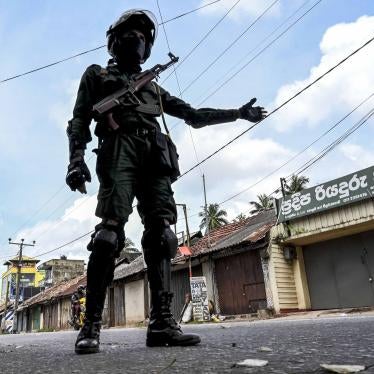(New York) - The Sri Lankan government is abusing antiterrorism legislation to clamp down on journalists who expose human rights abuses, official corruption, or otherwise question the government’s handling of the civil war with the Liberation Tigers of Tamil Eelam (LTTE), Human Rights Watch said today.
Standard Newspapers Ltd., which publishes a leading Sinhalese-language weekly Mawbima and the English-language weekly Sunday Standard, stopped operations on March 29. Sixteen days earlier, the government froze the company’s assets, citing suspected links to the LTTE.
On February 27, the police’s Terrorist Investigation Division arrested the company’s spokesman and financial director, Dushantha Basnayake, under the Prevention of Terrorism Act, and has detained him without charge since then. The law grants security forces sweeping powers of arrest and provides for detention up to 12 months without charge.
“The government is using antiterrorism legislation to silence the press,” said Sam Zarifi, Asia research director for Human Rights Watch. “As the war heats up, the government is clamping down on criticism and dissent.”
Tamil-language media have often come under government pressure, but the closure of Mawbima is the first time in three decades that Sri Lankan authorities have shut down a Sinhalese-language newspaper.
Over the past year, Mawbima had reported on government corruption and human rights violations. The newspaper’s journalists had questioned the government’s role in the spiraling number of abductions and enforced disappearances as fighting between the government and LTTE escalated.
The owner of Standard Newspapers, Tiran Alles, is a close associate of two former ministers, Foreign Minister Mangala Samaraweera and Ports Development Minister Sripathi Sooriyaarachchi. Both ministers lost their jobs in February after criticizing the government’s human rights violations.
According to press reports, Sri Lankan President Mahinda Rajapakse accused the two sacked ministers of using Mawbima to plot against him during an executive committee meeting of the ruling Sri Lanka Freedom Party on February 11. Two days later, the government froze Standard Newspapers’ assets.
On November 22, agents of the Terrorist Investigation Division arrested Mawbima reporter Munusamy Parameswary, also under the Prevention of Terrorism Act, accusing her of “helping the LTTE and a suspected suicide bomber.” On March 22, the Supreme Court found no reasonable grounds for her detention and ordered her release.
“The government’s moves against Mawbima are a disturbing blow to press freedom in Sri Lanka,” Zarifi said. “Increasingly, critics of government policy are being treated as traitors and enemies of the state.”
The pressure against Mawbima and the Sunday Standard illustrates the deteriorating conditions for media freedom in Sri Lanka. At a press briefing on March 29, Sri Lankan President Mahinda Rajapakse pushed journalists to support the military in its fight against the LTTE. “Media should not highlight the lapses of our security forces which may be advantageous to the enemy,” he said.
On September 20 the Ministry of Defense sent a letter to media institutions requesting that “news gathered should be subjected to clarification and confirmation.” The ministry has not instituted any formal censorship, however. Both the president and his brother Gothabaya Rajapakse, the defense secretary, are known to call newspaper editors directly with complaints about their coverage.
All sides in Sri Lanka’s civil war have interfered with and sought to restrict the exercise of free speech and freedom of the press, Human Rights Watch said. In the areas under its control, the LTTE does not allow a free press. In other areas it has intimidated, attacked and sometimes killed journalists critical of their policies or actions.
The Karuna group, which split from the LTTE in 2004 and has been fighting alongside the government, has also interfered with the media, Human Rights Watch said. Since August, in the areas where it operates in the East, the Karuna group has blocked the sale of the Tamil-language dailies Virakesari, Thinakkural and Sudar Oli, which are critical of the armed group. In Batticaloa district, the only Tamil-language papers available are the state-owned Thinakaran and Thinamurasu, which are run by the Eelam People’s Democratic Party, another Tamil political party that is part of the Sri Lankan government. The Karuna group has issued death threats to newspaper vendors and distributors in Trincomalee, a strategic northeastern city that houses a major government navy base.






